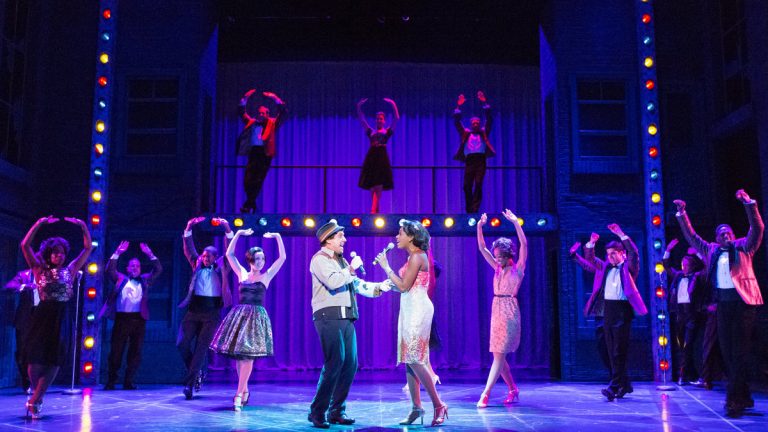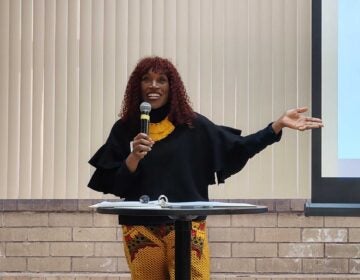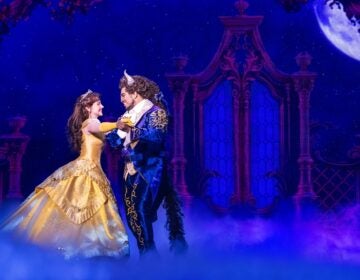Review: Race, rhythm and fervor in ‘Memphis’

Christopher Sutton, Kimber Sprawl and the ensemble in Memphis at Walnut Street Theatre. (Photo courtesy of Mark Garvin)
The infectious musical “Memphis,” which has a sweet sensibility about a serious issue, is big, blustery and a whole lot of fun at the Walnut Street Theatre, where it opened Wednesday with all cylinders pumping. “Pumping” defines both the Walnut’s production and the show by David Bryan and Joe DiPietro, which won the Tony for best new musical in 2010 and is filled with rousing songs in its depiction of an evolving America.
At the Walnut, it’s also a showcase for dancing – spirited and smart, choreographed by the show’s director, Richard Stafford. Exploiting the beats of musical styles that include rhythm and blues, gospel and rock, Stafford’s exciting dances sometimes look more like geometry than theater: arms, legs and torsos seem to be part of a grand design, and when you add Gail Baldoni’s colorful costumes into the mix, you get a human kaleidoscope.
It’s a joy to watch, and although “Memphis” has a second act that feels thin compared to its plot-racing, powerhouse first half, at the Walnut it doesn’t seem to matter much. By the end, you’re fixed on the cast as much as the characters – the plot, with its inter-racial love story, takes a back seat to the performances, particularly the musical ones. The story is very loosely modeled on the career of a man named Dewey Phillips, the first white DJ who dared to play music created and sung by blacks on radio stations serving mostly white audiences in Memphis, in the early ’50s. Whites called it “race music,” which was a not-so-nice way of saying it wasn’t proper for them. But Phillips knew better. He especially understood the power that the beat and spirit of those songs, played nightly at segregated clubs on Beale Street, would have on young people.
In “Memphis,” that character is named Huey Calhoun, and the one gripe I have with the Walnut’s production (other than a minor problem with the exuberance of Douglass G. Lutz’s excellent but sometimes overpowering pit orchestra) is the interpretation Christopher Sutton gives the character, under Stafford’s direction. Sutton strongly emphasizes the bumpkin in this DJ who changed Memphis by challenging its racism. Here he’s a naïf without wiles – it’s hard to buy into the character. Sutton, who’s been superb at the Walnut as Buddy the Elf and particularly as Buddy Holly, also affects a heavy Tennessee twang when he sings in “Memphis,” oddly Bob Dylan-esque, but as if Dylan were on coke. I did finally sync with the character because Sutton eventually projects a warmth that comes through the aw-shucks exterior.
And he also has a nice chemistry when his character falls for the black singer he’s admired since he first walked into an otherwise segregated club in a basement on Beale Street. She’s a talented bombshell at the Walnut, played by Kimber Sprawl, a young woman with a beautiful stage presence, an enormous voice and a bright future. When she sings a key song about change you believe in her fully: “Mama told me not to dream big but Mama lived her life running scared!” she declares, and the rest, well, you know the rest.
“Memphis” is a co-production with Riverside Theatre in Vero Beach, Fla. – the third time the two companies have worked together on a main-stage Walnut show. Still, it has “Walnut” written all over it – much of the creative team (director/choreographer Stafford included) have worked with the Walnut many times over the years, and several actors, like Sutton and Fran Prisco, who plays a number of roles in “Memphis,” have been welcome as regulars over the years. One of them, Mary Martello, even manages to act rings around a cast that can capably handle its own rings, thank you; she plays the wary mom of our DJ hero, soaked in a tradition of segregation and now facing a revolution led by her boy. Martello is so fully in the role that when she breaks out of her mold in a showstopper about the hardships of change, it’s a wonderfully organic evolution.
Philip Michael Baskerville is excellent as the brother of the singer who enters into a relationship that in Memphis, was illegal at the time, and dangerous. Nichalas Parker, once an acting apprentice at the Walnut, squeezes everything possible from a juicy showstopper he performs in the second half, and Travis Keith Battle is impressive as a man who says little. The rest of the fine cast cheerily runs with this show about the way some things change, and the way some don’t.
“Memphis” runs through July 12 at on the main stage of the Walnut Street Theatre, on Walnut between Eighth and Ninth Streets. www.walnutstreettheatre.org or 215-574-3550.
WHYY is your source for fact-based, in-depth journalism and information. As a nonprofit organization, we rely on financial support from readers like you. Please give today.




